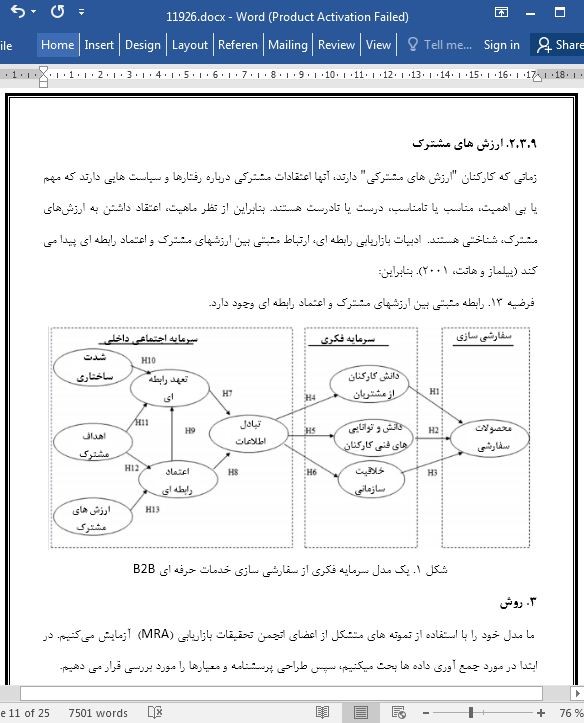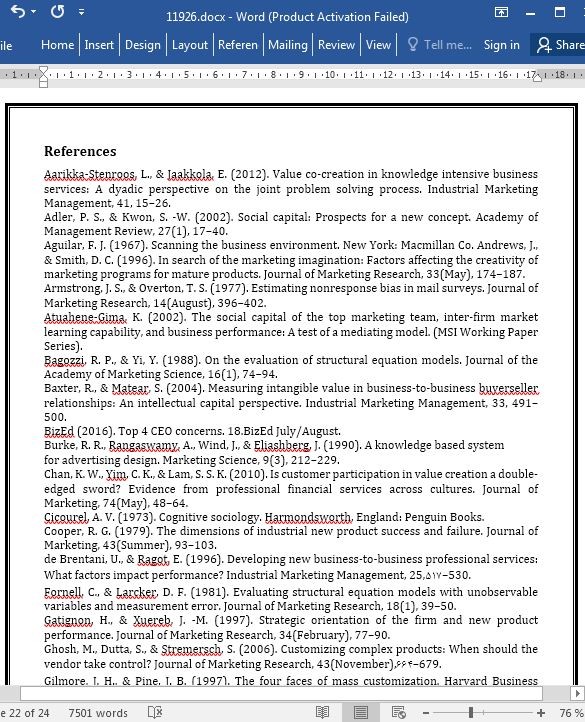
سفارشی سازی خدمات حرفه ای کسب و کار- به-کسب و کار (B2B)
چکیده
شرکتهای خدمات حرفه ای کسب و کار به کسب و کار (B2B)، اغلب پیشنهادات به شدت سفارشی شده را برای مشتریانشان ایجاد می کنند. سفارشی سازی خدمات حرفه ای B2B، یک فرایند دانش بنیان است که نیاز به تلاش های هماهنگ افرادی با مهارت و دانش خاص دارد. با استفاده از نظریه شخصی سازی و سرمایه اجتماعی، ما یک مدل سرمایه فکری (IC) برای شخصی سازی خدمات حرفه ای B2B طراحی و آزمایش می کنیم که در دو فرض بنیادی قرار می گیرند. اول، سه شکل مختلف IC، یعنی، دانش کارکنان از مشتریان، دانش و توانایی ها فنی کارکنان، و خلاقیت سازمانی، شرکت ها را در شخصی سازی خدمات حرفه ای B2B کاراتر می کند. دوم، سرمایه اجتماعی داخلی (ISC) یک پیشرو برای سرمایه فکری است که شرکت ها را برای تولید موثر خدمات حرفه ای B2B توانمند می کند. تحلیل های داده از آگاهی دهندگان 161 شرکت تحقیقاتی بازاریابی از فرض های ما پشتیبانی می کند.
1. مقدمه
خدمات حرفهای کسب و کار به کسب و کار (B2B) به سرعت در حال رشد هستند (لا، پترسون، و استایلز، 2009). علی رغم رشد این خدمات، تحقیق در مورد خدمات حرفه ای کسب و کار به کسب و کار (B2B)، محدود است. تحقیقات گسترده نشان می دهد که خدمات حرفه ای کسب و کار به کسب و کار (B2B)، توسط پیچیدگی (دی برنتانی و راگوت، 1996)، قدرت دانش (وانگ و ما، 2014)، و اهمیت مهارت ها و دانش خاص (لا و همکاران، 2009) مشخص می شوند، که کمک کرده است تا سفارشی سازی به ایجاد ارزش و مسئله اصلی مدیران ارشد اجرایی (CEO) تبدیل شود (بیز ای دی، 2016؛ چان، ییم، و لام، 2010). خدمات حرفه ای سفارشی سازی شده (1) برای یک مشتری خاص بسیار مناسب هستند، (2) شامل بسیاری از گزینه های خلاقانه هستند، (3) نیازمندی های متعدد خاص مشتری را بررسی میکنند، و (4) در محیط هایی با زمینه به شدت خاص تولید می شوند (بورک، رانگاسوامی، وایند، و الیاشبرگ، 1990). بسیاری از شرکت های تحقیقات بازاریابی- زمینه مطالعه ما- مدت زیادی است که پیشنهادات تحقیقات بازاریابی سفارشی را تولید کردهاند که متناسب با نیازهای دانشی خاص از مشتریان خاص هستند (مالهوترا، 1996). با این حال، هیچ تحقیقی به صورت خاص بر سفارشی سازی خدمات حرفه ای کسب و کار به کسب و کار تمرکز نمی کند.
Abstract
Business-to-business (B2B) professional service firms often develop highly customized offerings for their customers. Customizing B2B professional services is a knowledge intensive process that requires the coordinated efforts of individuals with specialized knowledge and skills. Drawing on customization and social capital theory, we develop and test an intellectual capital (IC) model of customizing B2B professional services that rests on two foundational premises. First, three different forms IC, that is, employees' knowledge of customers, employees' technical knowledge and abilities, and organizational creativity, make firms more effective at customizing B2B professional services. Second, internal social capital (ISC) is a precursor to the intellectual capital that enables firms to effectively produce customized B2B professional services. Analyses of data from key informants of 161 marketing research firms support our theses.
1. Introduction
Business-to-business (B2B) professional services are growing rapidly (La, Patterson, & Styles, 2009). Despite its growth, research on B2B professional services is limited. Extant research suggests that B2B professional services are characterized by complexity (de Brentani & Ragot, 1996), knowledge intensity (Wang & Ma, 2014), and the importance of specialized skills and knowledge (La et al., 2009), which has contributed to customization becoming central to value creation and a major concern of CEOs (BizEd, 2016; Chan, Yim, & Lam, 2010). Customized professional services (1) are highly tailored for one, specific customer, (2) involve many creative options, (3) address numerous individualized customer requirements, and (4) are produced in highly context-specific, environments (Burke, Rangaswamy, Wind, & Eliashberg, 1990). Many marketing research firms–the context of our study–have long produced customized marketing research offerings that are tailored to the specific knowledge needs of individual clients (Malhotra, 1996). However, no research specifically focuses on the customization of B2B professional services.
چکیده
1 مقدمه
2. توسعه مدل
2.1. سفارشی سازی
2.2. سرمایه فکری
2.3. سرمایه اجتماعی داخلی
3. روش
3.1. جمع آوری داده ها
3.2.خصوصیات اطلاع دهندگان کلیدی
3.3.مشخصات نمونه
3.4. تمایل غیرواکنشی
3.5. پیش آزمون
3.6. معیارها
3.7. تمایل روش متداول برای اقدامات احتیاطی و آزمایش
3.8.اعتبار سنجی اندازه گیری
4. نتایج
5. بحث
5.1. پیامدهای نظریه و عمل
5.2. محدودیت ها و تحقیقات آینده
منابع
Abstract
Keywords
1. Introduction
2. Model development
2.1. Customization
2.2. Intellectual capital
2.3. Internal social capital
3. Method
3.1. Data collection
3.2. Key informant characteristics
3.3. Sample characteristics
3.4. Nonresponse bias
3.5. Pretest
3.6. Measures
3.7. Common method bias precautions and test
3.8. Measurement validation
4. Results
5. Discussion
5.1. Implications for theory and practice
5.2. Limitations and future research
Appendix A. Measures
References
- اصل مقاله انگلیسی با فرمت ورد (word) با قابلیت ویرایش
- ترجمه فارسی مقاله با فرمت ورد (word) با قابلیت ویرایش، بدون آرم سایت ای ترجمه
- ترجمه فارسی مقاله با فرمت pdf، بدون آرم سایت ای ترجمه



